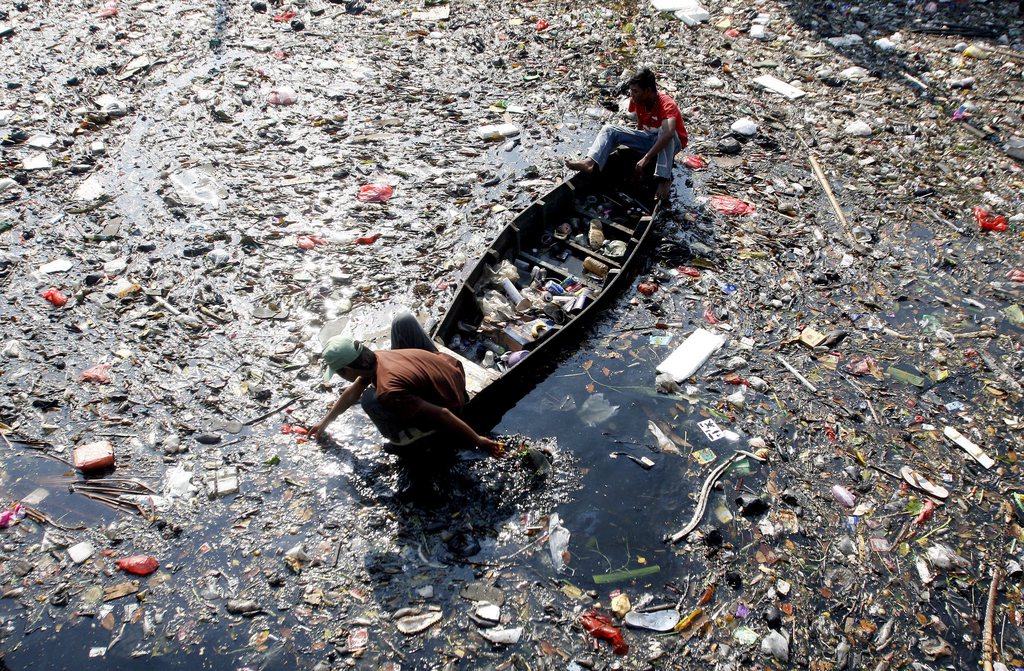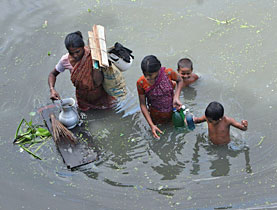New pollution sources put lives at risk

The world is becoming an unhealthier place to live in as new pollutants claim lives, particularly in developing nations, a report has warned.
Two environmental groups, including Green Cross Switzerland, presented a list of the ten worst pollution problems in the world that primarily put children at risk of death, disability and chronic illnesses.
The list includes new sources of toxins such as lead acid from battery recycling carried out in many developed countries to supplement meagre incomes.
Another problem is high levels of arsenic found in water supplies as more wells are dug to meet the demand of growing populations.
The Green Cross, along with the United States-based Blacksmith Institute, cited evidence on Wednesday that between 25 and 40 per cent of all deaths worldwide are caused by water, air and soil pollution.
One of the biggest obstacles to tackling the problem is that new pollutants are constantly appearing, having a dramatic effect on people who do not understand the dangers or who are too poor to implement safety measures.
“We can see that the problem of pollution is evolving, as soon as one problem is solved another emerges. It is important to keep track of these new sources before too many people die,” Nathalie Gysi, executive director of Green Cross Switzerland, told swissinfo.
$400m fund
One of the latest causes for concern is the growing “business” of using bare hands to strip out lead from old car batteries. Gysin said that communities in developing countries are involved in this dangerous form of recycling to earn money.
“The price of lead is rising as more is needed for the expanding car market. We know of African families who have lost all of their children to lead poisoning,” she said.
“Such demand creates a bigger market for the poor, but they are not working in proper conditions or simply lack knowledge of the dangers.”
Green Cross Switzerland is planning to launch a $400 million (SFr466 million) health and pollution fund to help solve pollution problems in developing countries. The money would be spent on education, setting up safe working conditions and isolating sources of pollution to avoid further contamination.
Many of the pollution sources have not received much publicity so far, but the list also contained some familiar suspects: radioactive waste, untreated sewage water, mining, poor urban air quality and metals processing.
Green Cross Switzerland and the Blacksmith Institute have collaborated on the issue of pollution since 2006 but have switched their attention this year from naming the worst polluters to identifying the worst sources of toxins.
swissinfo, Matthew Allen in Zurich
Green Cross Switzerland and the Blacksmith Institute identified the 10 worst pollution problems causing death and disability in the world:
Indoor air pollution: burning coal or unprocessed biomass fuels in homes, schools or work places. This is blamed for some three million deaths every year.
Industrial mining: inadequate disposal of rock and waste results in acid and other toxins leaking into the soil and water supplies.
Artisanal gold mining: up to 15 million workers are affected by mercury poisoning used in extracting gold.
Groundwater contamination: digging more wells deeper into the ground exposes people to higher levels of arsenic.
Contaminated surface water: virtually all rivers in developing countries have poor water quality.
Smelting and processing metals: releases high levels of carbon dioxide and other chemicals into the atmosphere.
Radioactive waste and uranium mining: some radioactive waste materials can take up to a million years to become harmless to humans.
Untreated sewage: the World Health Organisation (WHO) estimated that some 2.6 billion people lack access to adequate sanitation facilities in 2008.
Urban air quality: WHO estimates that air pollution in urban areas accounts for 865,000 deaths per year world wide.
Lead acid battery recycling: a growing business in developing countries where lead is stripped out suing bare hands.

In compliance with the JTI standards
More: SWI swissinfo.ch certified by the Journalism Trust Initiative



You can find an overview of ongoing debates with our journalists here. Please join us!
If you want to start a conversation about a topic raised in this article or want to report factual errors, email us at english@swissinfo.ch.